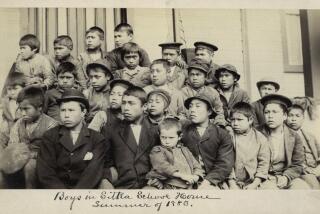Simulated Slave Auction as History Lesson
- Share via
Re “Slave Auction: Educational or Demeaning?” Voices, Nov. 8: One does not have to be African American to be offended by the comments of West High Principal Alexis Sheehy. Sheehy appears concerned only with defending her school’s programs and not at all worried about the impact of the “slave auction” on her students.
The insensitivity shown by Sheehy and by Natalie Jackson’s teacher--even going so far as to blame Natalie because she did not complain sooner!--is truly appalling. Every adult at West High connected with this sorry episode owes Natalie an apology.
BONNIE K. SLOANE
Los Angeles
* It is possible to have an effective role-playing scenario dealing with slavery. However, a slave auction is not appropriate. The purpose of role-playing is to inspire students to verbally explore the historical points of view. It isn’t very hard to think of a different role-playing scenario that would give students the opportunity to verbally explore how it would feel to be a slave without creating a constraining and humiliating role.
Sheehy has further denigrated Jackson and all high school students by either failing to understand or choosing to ignore an intelligent student’s point of view. Ironically, the principal is actually treating students like slaves by failing to hear them.
STEVE WAGNER
Long Beach
* The only thing West High School is guilty of is educating. The acting out of a slave auction is based on historical facts. However sensitive this issue may be to some students, they are events that occurred in U.S. history.
My children, who are African American, attend El Rodeo Elementary School, which is a predominantly white school. When my oldest daughter was in eighth grade she had a similar lesson on the slave trade, where some students posed as slaves. Her teacher also brought in films on the civil rights movement, which were very difficult for some students to watch. My daughter was amazed at how many of her peers did not believe these were actual instances which occurred in this country. My younger daughter, who was in fourth grade last year, was fortunate enough to have a guest speaker who talked about his ancestors having been slaves and working on cotton plantations.
Both my daughters felt a great sense of pride in these lessons, to have had a part of their history (American history) shared with their fellow classmates.
ADELE CADRES
Los Angeles
More to Read
The biggest entertainment stories
Get our big stories about Hollywood, film, television, music, arts, culture and more right in your inbox as soon as they publish.
You may occasionally receive promotional content from the Los Angeles Times.










